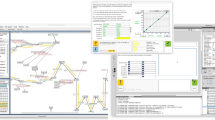Abstract
One of the major arguments for teaching pupils to program in Logo is the claim that this experience results in the acquisition of general thinking skills. However, research concerning this “cognitive-effects hypothesis” has shown that Logo as such does not lead to the spontaneous development of general thinking skills; this can only be obtained if Logo is embedded in a powerful teaching-learning environment aimed at the acquisition and transfer of those skills. These findings have led us to address the following research question: Is it desirable to build a part of the instructional support into the computer system? In order to study this issue, we developed a Logo-based tool-kit and computer coach that supports the acquisition of a Logo programming strategy, including planning and debugging skills. In this contribution we present the theoretical and empirical background and the design of this computer system.
Access this chapter
Tax calculation will be finalised at checkout
Purchases are for personal use only
Preview
Unable to display preview. Download preview PDF.
Similar content being viewed by others
References
Carver, S. (1988). Learning and transfer of debugging skills: Applying task analysis to curriculum design and assessment In R. E. Mayer (Ed.), Teaching and learning computer programming. Multiple research perspectives. Hillsdale, NJ: Lawrence Erlbaum Associates.
Clark, R. E. (1992). Facilitating domain-general problem solving: Computers, cognitive processes and instruction. In E. De Corte, M. Linn, H. Mandl, & L. Verschaffel (Eds.), Computer-based learning environments and problem solving (NATO/ASI Series F: Computer and Systems Sciences, Vol. 84). Berlin: Springer-Verlag.
Clements, D. H. (1990). Metacomponential development in a Logo programming environment Journal of Educational Psychology, 82, 141–149.
Clements, D. H. (1992). The role of social interaction in the development of higher-order thinking in Logo environments. In E. De Corte, M. Linn, H. Mandl, & L. Verschaffel (Eds.), Computer-based learning environments and problem solving (NATO/ASI Series F: Computer systems and sciences, Vol. 84). Berlin: Springer-Verlag.
Cobb, P. (1990). A constructivist perspective on information-processing theories of mathematical activity. International Journal of Educational Research, 14, 67–92.
Collins, A., Brown, J. S., & Newman, S. E. (1989). Cognitive apprenticeship: Teaching the craft of reading, writing and mathematics. In L. B. Resnick (Ed.), Knowing, learning, and instruction. Essays in honor of Robert Glaser. Hillsdale, NJ: Lawrence Erlbaum Associates.
De Corte, E. (1990). Towards powerful learning environments for the acquisition of problem-solving skills. European Journal of Psychology of Education, 5, (1), 5–19.
De Corte, E., & Verschaffet, L. (1989). Logo, a vehicle for thinking. In B. Greer & G. Mulhern (Eds.), New directions in mathematics education. London: Routledge.
De Corte, E., Verschaffel, L., & Schrooten, H. (1990, March). Cognitive effects of computer-oriented learning. Paper presented at the Seventh International conference on Technology and Education, Brussels, Belgium.
De Corte, E., Verschaffel, L., & Schrooten, H. (1992). Cognitive effects of learning to program in Logo: A oneyear study with sixth graders. In E. De Corte, M. Linn, H. Mandl, & L. Verschaffel (Eds.), Computer-based learning environments and problem solving (NATO/ASI Series F: Computer and Systems Sciences, Vol. 84). Berlin: Springer-Verlag.
Lehrer, R., Guckenberg, R., & Sancilio, L. (1988). Influences of Logo on children’s intellectual development. In R. E. Mayer (Ed.), Teaching and learning computer programming. Multiple research perspectives. Hillsdale, NJ: Lawrence Erlbaum Associates.
Leron, U. (1985). Logo today: Vision and reality. The computer teacher, 26-32.
Littlefield, F., Delclos, V. R., Lever, S., Clayton, K. N., Bransford, J. D., & Franks, J. J. (1988). Learning Logo: Method of teaching, transfer of general skills, and attitudes toward school and computers. In R. E. Mayer (Ed.), Teaching and learning computer programming. Multiple research perspectives. Hillsdale, NJ: Lawrence Erlbaum Associates.
McCoy Carver, S., & Klahr, D. (1986). Assessing children’s Logo debugging skills with a formal model. Journal of Educational Psychology, 76, 1051–1058.
Miller, M. L. (1982). A structured planning and debugging environment for elementary programming. In D. Sleeman & J. S. Brown (Eds.), Intelligent tutoring systems. New York: Academic Press.
Noss, R. (1986). Creating a mathematical environment through programming: A study of young children learning Logo. Doctoral dissertation. London: Department of Mathematics, Statistics and Computing, University of London.
Papert, S. (1980). Mindstorms. Children, computers, and powerful ideas. New York: Basic Books.
Salomon, G. (1992). Effects with and of computers and the study of computer-based learning environments. In E. De Corte, M. Linn, H. Mandl, & L. Verschaffel (Eds.), Computer-based learning environments and problem solving (NATO/ASI Series F: Computer and Systems Sciences, Vol. 84). Berlin: Springer-Verlag.
Scardamalia, M., Bereiter, C., McLean, R. S., Swallow, J., & Woodruff, E. (1989). Computer-supported intentional learning environments. Journal of Educational Computing Research, 5, 51–68.
Swan, K. (1989). Logo programming and the teaching and learning of problem solving. Journal of Artificial Intelligence in Education, 1(1), 73–92.
von Glasersfeld, E. (1987). Learning as a constructive activity. In C. Janvier (Ed.), Problems of representation in the teaching and learning of mathematics. Hillsdale, NJ: Lawrence Erlbaum Associates.
Author information
Authors and Affiliations
Editor information
Editors and Affiliations
Rights and permissions
Copyright information
© 1993 Springer-Verlag Berlin Heidelberg
About this chapter
Cite this chapter
De Corte, E., Verschaffel, L., Schrooten, H., Olivie, H., Vansina, A. (1993). A Logo-Based Tool-Kit and Computer Coach to Support the Development of General Thinking Skills. In: Duffy, T.M., Lowyck, J., Jonassen, D.H., Welsh, T.M. (eds) Designing Environments for Constructive Learning. NATO ASI Series, vol 105. Springer, Berlin, Heidelberg. https://doi.org/10.1007/978-3-642-78069-1_6
Download citation
DOI: https://doi.org/10.1007/978-3-642-78069-1_6
Publisher Name: Springer, Berlin, Heidelberg
Print ISBN: 978-3-642-78071-4
Online ISBN: 978-3-642-78069-1
eBook Packages: Springer Book Archive




